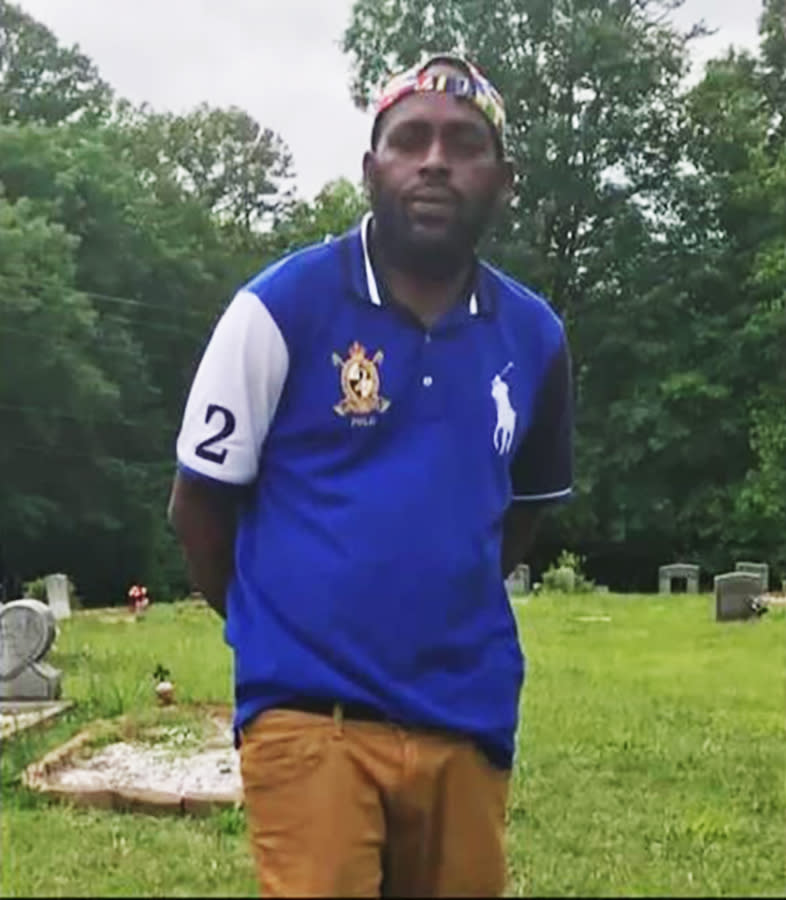North Carolina police release video of man who died of cocaine overdose in custody

Five North Carolina police officers who resigned following the death of a suspect in custody "knew or should have known" the man was in desperate need of medical help, the police chief said Thursday.
Harold Easter, 41, died in January from a cocaine overdose after he sat unattended in a police interview room for several valuable minutes when he could have been seen by a doctor, Charlotte-Mecklenburg Police Chief Johnny Jennings told reporters.
The chief spoke after the department released hours of video showing the arrest and detainment of Easter on charges of cocaine and marijuana possession.
Easter was the subject of a narcotics investigation and was pulled over in the vehicle he was driving and arrested at 11:30 a.m. Jan. 23, according to a timeline provided by the Mecklenburg County District Attorney's Office.
He was transported to the police department's Metro Division Office and at 12:19 p.m. was placed in an interview room, where he was not continuously supervised, according to prosecutors. He fell to the floor at 1:06 p.m. before an officer found him at 1:13 p.m. and called for medical help, the district attorney's office said.
It was clear that Easter had swallowed a dangerous amount of cocaine and needed help as soon as he was arrested, Jennings said. He also accused officers of leaving Easter in an interview room for more than 15 minutes, in violation of department rules.
"It's clear to me that the officers knew — or should have known — based on comments made by the officers, based on comments made from Mr. Easter himself," Jennings said. "There's no doubt in my mind that officers either knew or should have known that he had ingested cocaine."
The chief, however, left open the chance that Easter might have died even with more immediate care.

"I believe if they had followed policy, we would have at the minimum given Harold Easter a chance," he said. "I can tell you we have a responsibility to at least give him that chance to survive, and that's what officers failed to do."
Video released under court order Thursday and seen by NBC News showed Easter in the interview room, ranting incoherently for about a half-hour. He eventually slowed his speech and then slumped in his chair, over a table and then on to the floor.
"I am going to die," Easter said at one point.
Shortly after Easter fell to the floor, an officer who went into the room immediately yelled out, "Get medic!"
Easter was rushed to a hospital and died three days later.
Police spokesman Rob Tufano warned anyone seeking to watch the video that it was disturbing.
"Incredibly tough, tough stuff to watch, excruciating stuff to watch," Tufano said. "You're watching a 41-year-old man lose his life."
None of the officers involved — Sgt. Nicolas Vincent and officers Brentley Vinson, Michael Benfield, Michael Joseph and Shon Sheffield — was criminally charged. They resigned this week.
A representative for the Charlotte-Mecklenburg Fraternal Order of Police, the union representing officers, could not immediately be reached for comment Thursday afternoon. It was unclear whether any of the officers had legal representation.
A Sept. 21 report by Mecklenburg County District Attorney Spencer Merriweather to the State Bureau of Investigation said "there was a brief struggle between Officer Sheffield and the decedent during which the decedent either continued to eat, or tried to eat, cocaine."
According to Merriweather's report, Joseph was recorded on body camera video telling Easter, who had complained of dehydration: "You've got cocaine on your tongue. It's going to happen when you try to eat cocaine."
The district attorney's report on whether the officers' actions were unlawful said he would not seek criminal charges, writing that prosecutors would not be able to convince jurors that any officers "culpably failed to obtain medical attention" and that — in consultation three medical experts — he cannot "prove beyond a reasonable doubt that the decedent would have lived had officers sought medical attention immediately."
Merriweather added in the report that there was no video of Easter "ingesting any contraband in the presence of officers" and "no footage containing indisputable admissions by Mr. Easter to officers to having eaten contraband."
Merriweather said he consulted with multiple medical experts and other assistant district attorneys while conducting the investigation. He also presented the findings to the District Attorney's Officer-Involved Shooting Review Team for its expertise in "the laws surrounding fatal incidents that involve officers."
Jennings, the police chief, said Thursday: "I don't believe these officers had malicious intent, but they did make a bad decision, and they didn't follow policy.
"So these bad decisions have consequences, especially when those decisions have contributed to the loss of a life, a life that we had the responsibility to protect," he said. "Someone that's in our custody is also in our care."
Easter's family has not decided whether to file a lawsuit, family attorney Alex Heroy said. Easter's mother and sister had seen the video months before it was released Thursday.
"Very tough to watch, to see their loved one die in the most painful, awful way," Heroy said Thursday night.

